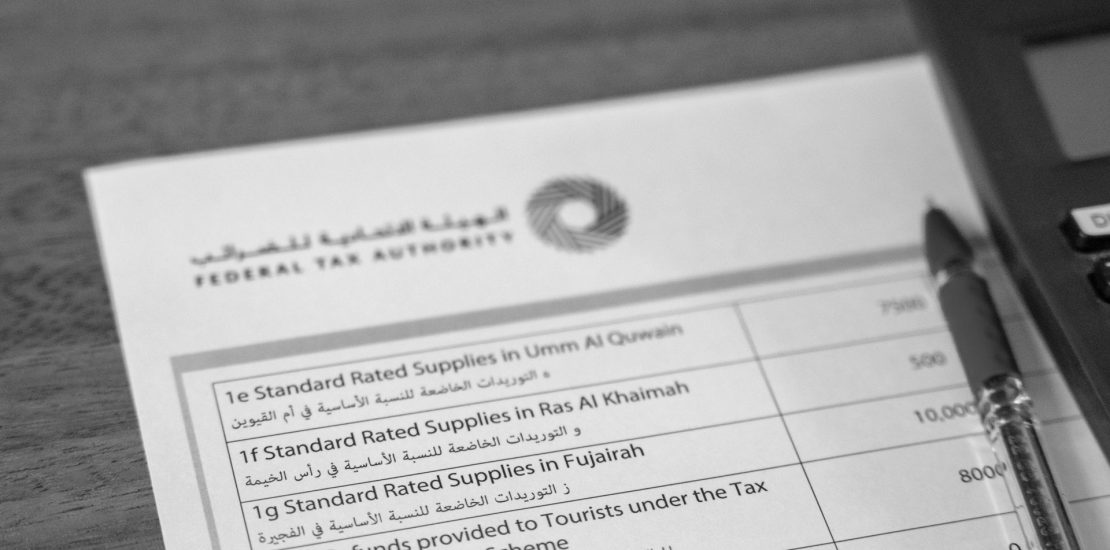Understanding UAE Tax Invoice Requirements
- 18.10.2025
- Posted by: Uwe Hohmann
- Categories: Tax, Dubai

Regular compliance reviews reveal a persistent issue across UAE businesses: invalid tax invoices that prevent VAT (Value Added Tax) recovery.
The financial impact of this oversight can be substantial, with businesses missing out on reclaiming Input VAT due to incomplete documentation.
The Compliance Gap
The FTA (Federal Tax Authority) maintains strict requirements for what constitutes a valid tax invoice under Article 59 of the UAE VAT Executive Regulation. These requirements are not discretionary. A tax invoice must contain all mandatory elements without exception, and the absence of even a single required field renders the entire document invalid for VAT recovery purposes.
When a supplier issues a tax invoice that does not meet FTA standards, the recipient loses the right to claim Input VAT on that transaction. The VAT paid becomes a sunk cost, directly impacting the business’s cash flow and tax position.
Record Keeping
Missing a single mandatory element on a tax invoice can invalidate your entire VAT recovery claim, transforming recoverable tax into a permanent business cost.
Article 59 of the UAE VAT Executive Regulation establishes twelve mandatory elements that must appear on every standard tax invoice. Compliance is absolute. Partial compliance does not satisfy the regulatory requirement.
All standard tax invoices must contain the following elements:
Mandatory Requirements for Standard Tax Invoices
Missing a single mandatory element on a tax invoice can invalidate your entire VAT recovery claim, transforming recoverable tax into a permanent business cost.
Article 59 of the UAE VAT Executive Regulation establishes twelve mandatory elements that must appear on every standard tax invoice. Compliance is absolute. Partial compliance does not satisfy the regulatory requirement.
All standard tax invoices must contain the following elements:
- The designation “Tax Invoice” is prominently displayed on the document
- Supplier information: full legal name, complete registered address, and VAT TRN (Tax Registration Number)
- Recipient information: full legal name, complete registered address, and VAT TRN (where the recipient is VAT registered)
- A unique invoice number following either a sequential or uniquely identifiable pattern
- The date of issue is clearly stated
- The date of supply (where it differs from the invoice date)
- A complete description of the goods or services supplied
- Line item specifications for each good or service: unit price, quantity or volume, applicable tax rate, and amount payable in AED
- Discount amount (where applicable), separately identified
- The gross amount payable is expressed in AED
- The tax amount payable is expressed in AED, including the exchange rate applied where the transaction was originally denominated in foreign currency
- Reverse charge statement (where applicable): explicit confirmation that the recipient bears responsibility for accounting for the tax, with appropriate reference to the relevant provision of the Decree-Law
Simplified Tax Invoice Provisions
The regulations provide for simplified tax invoices under specific circumstances. Understanding these provisions enables businesses to reduce administrative burden where appropriate while maintaining compliance.
Simplified invoices are permissible when the recipient is not registered for VAT purposes. They are also acceptable when the recipient holds VAT registration, but the transaction value does not exceed AED 10,000.
The simplified format requires fewer elements than a standard tax invoice. The document must still display “Tax Invoice” as its designation and include the supplier’s name, address, and VAT TRN. The issue date, description of goods or services supplied, and the total consideration with separately stated tax amount remain mandatory. However, detailed recipient information and itemized line breakdowns are not required under this format.
Financial and Regulatory Implications
The consequences of processing invalid tax invoices extend beyond individual transaction losses. Systematic acceptance of non-compliant documentation creates exposure to broader regulatory scrutiny.
During FTA audits, examiners assess whether businesses maintain adequate controls for verifying supplier invoice compliance. Evidence of systematic deficiencies in invoice validation procedures may result in challenges to Input VAT claims across multiple tax periods. Such challenges can generate substantial reassessments accompanied by penalties and interest charges.
From an operational perspective, identifying invalid invoices after a significant time has elapsed complicates remediation efforts. Requesting corrected documentation from suppliers months after transaction completion often encounters resistance, particularly when suppliers have already finalized their accounting records for the relevant period.
TME Services - Your Complete Business Partner
Our comprehensive services are designed to support you every step of your business journey:
- Company Formation: We guide you through all aspects of setting up your company, whether in a free zone or on the mainland, ensuring you choose the best option for your business.
- Visa and Emirates ID Services: We streamline the process of securing visas and Emirates IDs for you and your employees, allowing you to focus on your business operations.
- Accounting: Our team ensures your business stays compliant with local financial regulations, which is crucial for maintaining good standing in Dubai’s business community.
- Tax: We help manage Dubai’s tax environment, ensuring your business remains compliant while optimizing your tax position.
- Business Consulting: Leveraging our deep understanding of Dubai’s market, we provide valuable insights and help you develop effective strategies to succeed.
Visit our services page to learn more about everything we do.
-
21 Feb 2026 DubaiUAE Non-Oil GDP Grows 6.1%
-
21 Feb 2026 TaxUAE Tax Invoicing Mandatory Requirements
-
21 Feb 2026 DubaiMoHRE Completes Consultation on the Alternative End-of-Service Savings Scheme
-
13 Feb 2026 TaxUAE Ministry of Finance Designates VARA as Competent Authority Under CIT Framework
-
13 Feb 2026 TaxUAE Cabinet Decision Exempts Certain Sports Entities from Corporate Income Tax